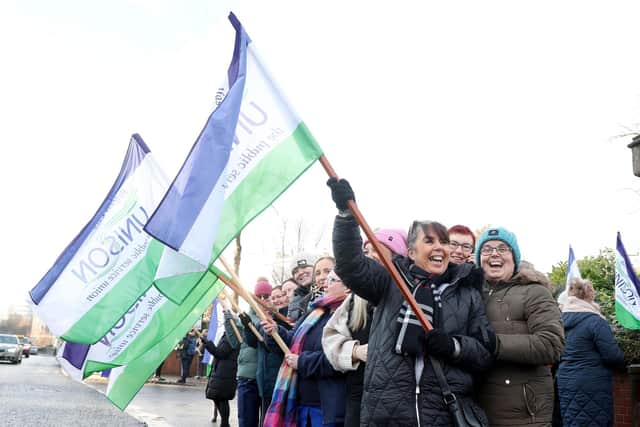‘Already fragile’ health service will be ‘further impaired’ by nurses’ strike, warn Stormont chiefs
and live on Freeview channel 276
Members of the Royal College of Nursing across all five regional health trusts will take strike action for the second time in three years to appeal for safe staffing levels and fair pay.
The head of the nurses’ union in Northern Ireland, Rita Devlin, has said a pay award would help the health service retain staff and “would almost certainly lead us on the road to recovery”.


Advertisement
Hide AdAdvertisement
Hide AdThe Department of Health, however, has warned the timing of the strike – which comes just days after members of Unison and Nipsa staged walkouts at hospitals across Northern Ireland – has caused “particular concern”.
In a hard-hitting statement issued on the eve of the industrial action, a spokesperson for the Stormont department said: “The Department of Health fully understands the frustration and deep concern of staff across health and social care, who have worked in extremely challenging circumstances over the last three years and continue to do so.
“In respect of tomorrow’s planned action by Royal College of Nursing, intensive work is ongoing to mitigate the impact on patients where possible. There has been constructive partnership working between the RCN and the Chief Nursing Officer and HSC Trust Directors of Nursing on patient safety issues, including derogations from strike action to maintain critical services.
“However, as the Department has previously stated, already fragile services will inevitably be further impaired by industrial action.
Advertisement
Hide AdAdvertisement
Hide AdThere is particular concern at the cumulative impact of repeated strike days, at a time when the health service is facing what many regard as the most challenging winter in its history.”
The spokesperson continued: “The industrial dispute is a national dispute which is only resolvable at national level. Northern Ireland has a policy of pay parity with England for nurses and other HSC workers covered by the Agenda for Change framework.
“The Department of Health remains extremely concerned at the scale of the current pressures on health and social care services – and the impact this is having on patients, service users, carers and staff.
The challenges being faced here are mirrored in neighbouring jurisdictions. It is the reality that there are no quick or simple solutions.
Advertisement
Hide AdAdvertisement
Hide AdThe focus of the HSC system remains on maximising its existing capacity to the greatest possible level and managing risk. Priorities include reducing ambulance handover times, relocating patients where clinically appropriate from Emergency Departments to other parts of hospitals, and achieving timely discharge of patients who are medically fit to leave hospital.”
The statement added: “While such measures are important and can make a difference on the ground, they will not by themselves resolve the fundamental problem at the heart of current pressures: the serious mismatch between the demand for care and the current capacity of the system to meet it.
“That can only be fixed by sustained and long-term action to secure greater capacity.”
Rita Devlin, Director of the RCN in Northern Ireland said: “It is with a heavy heart that many nurses will be standing on picket lines this morning instead of in hospital wards and in our community caring for patients. I am absolutely clear that no member of nursing staff wants to be in this position but we have been left with no choice but to take action.
Advertisement
Hide AdAdvertisement
Hide Ad“As we have seen this week, all areas of health care are under enormous pressure. Those working in the service are the same staff that have just carried us through a pandemic and are now being expected to deal with unsafe staffing levels, leaving them unable to provide the care for patients that they want to. We simply cannot continue like this for much longer.
“Following the pay award imposed by the Department of Health last week, experienced nurses in Northern Ireland are around 20% worse off in real terms compared to 10 years ago. Not only is this totally unfair but it is a key factor in the severe nurse staffing shortages affecting patient safety. We have almost 3000 unfilled nursing posts in the HSC across Northern Ireland and we believe there is a similar number in the private sector, including nursing homes.
“Nursing is facing a recruitment and retention crisis. Our only option is to secure a fair pay award to ensure we retain the experienced and invaluable nursing staff within the service. If we don’t begin to support these staff, they will leave. It is also crucial that we take forward the measures agreed following our last strike action to address safe staffing levels, particularly the implementation of safe staffing legislation. Finally, we need strong, accountable political leadership to ensure we can make the decisions needed to transform our services and make it fit for purpose for all of us who use it.
“While we will not solve the crisis in our health service overnight this would almost certainly lead us on the road to recovery.”